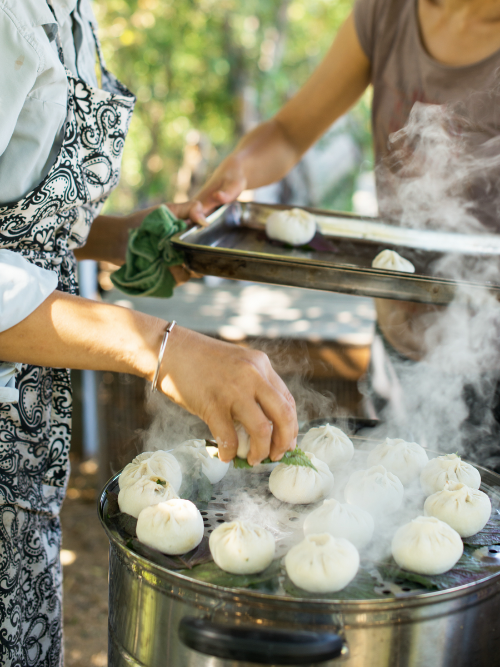

The couple also don't use any pesticides or herbicides, and have applied their knowledge to use existing natural food chain to get rid of pests or weeds.
They have managed to raise more than 200 chickens and nearly 30 sheep, as well as several geese, dogs, cats and rabbits.
They have since reduced the number of animals to ease the burden on the land.
The animals eat the weeds at the orchard, where a dozen fruit trees offer apricots, pears, plums and chestnuts.
Wild animals are sometimes let in to consume the fruit falling off the trees.
"It's all about balance and making full use of everything, including the waste," Zhang says.
Although everything requires manual work, Zhang says they have been given opportunities to create a living that provides a lasting happiness.
"You'll have many inconveniences to overcome with brains and brawn, but the success will give you a sense of satisfaction," Zhang says.
They have set up a small meteorological station to collect data that has given them insight into the local climate conditions.
Infrared cameras have also been mounted to observe the wildlife, and they have found a surprising variety of wild animals, including leopard cats, a national level II protected species.
"We were beyond thrilled when we saw them for the first time," Zhang says.

Other animals include hedgehogs, shrews, weasels, roe deer and badgers.
The harvest is an additional reward.
"The jams we make out of the fruits that mature under natural conditions are really tasty," Zhang says.
After spending most of the daytime working in the field, the couple will stay in at night to watch a movie, listen to some music or read in the house before retiring to bed at around 10 pm.
As they have worked out a way of coexisting with nature, Zhang has begun to develop activities that enable children and parents to experience the lifestyle.
"They will see our water conserving device and environmentally-friendly detergents," Zhang says, adding that she's relieved to hear them say they will try such things back in the city.
"Some parents told me that their children have shortened their bathing time to save water following their visit," she adds.
Recently, the couple published a book that recounts their life in the mountains, including survival skills and their interactions with nature.
"We hope it will help our readers to address realistic problems while better understanding the relationship between people and nature from various perspectives," Zhang says.
In her opinion, a considerable number of modern people are afraid of animals, even insects, because they don't know the habits of the creatures.
"The young couple have found a life in the rural soil and nature, while giving back to them and taking care of other lives sharing the same space," says Lyu Zhi, a professor of life sciences from Peking University.
"It is an integration of self-fulfillment and altruism," Lyu says.
It's seven years before the lease on their plot is up, and the couple will continue their existing life in the mountains until then.
"We'll see if we can get a renewal," Zhang says.
"If not, we will find another place to live and offer other urban residents the possibility of enjoying a lifestyle coexisting with nature."